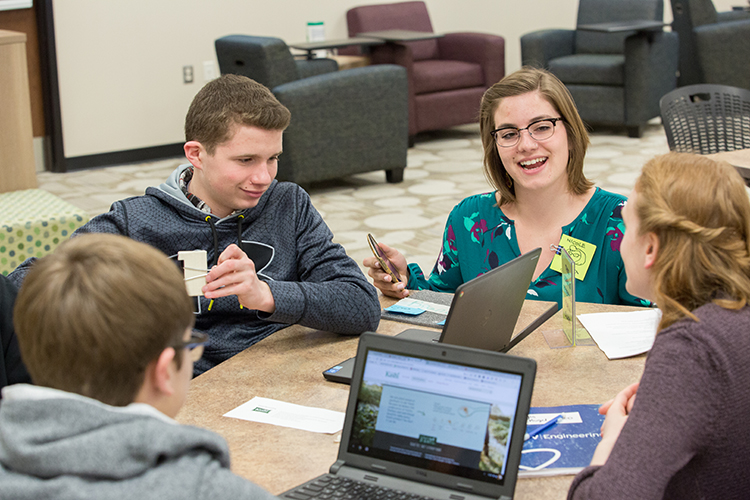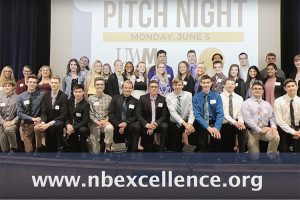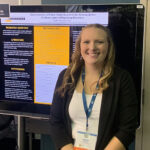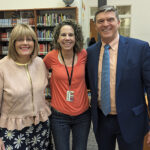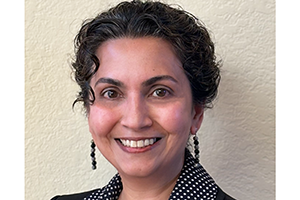The high school students started class by discussing their company’s business model. Called Cozy Up, the business they were planning would sell blankets. Their task for the day was to develop the company’s brand.
“Blankets are something everyone uses, so we decided to sell those,” said Sarah Miller, one of the students in the group. “We use organic materials because we’re trying to make the products eco-friendly.”
Cozy Up was designed around a “one for one” business model — for every blanket sold, a blanket would also donated to a child in a hospital.
Miller, who will be a sophomore in UW-Milwaukee’s Lubar School of Business in the fall, was among a group of juniors and seniors at New Berlin’s Eisenhower and West high schools who learned to think like entrepreneurs through their school district’s Advanced Innovation & Design course. First taught in 2017, the class is co-facilitated by the Lubar Entrepreneurship Center. Upon successful competition of the course, students like Miller can apply for three UWM credits.
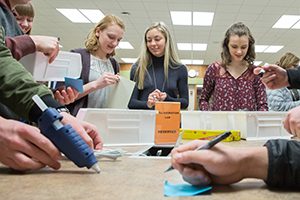
“We started this program to address the concern over declining dynamism in our economic development region. The students of today are the entrepreneurs of the future,” said Laura Schmidt, strategic advisor to the superintendent of the School District of New Berlin. “In this class, there’s no one right answer to the challenges. That’s what’s different about it.”
The class, which finished its second year in New Berlin in June 2018, divides students into project teams for the duration of the semester. Each team takes on a challenge, in areas including technology, engineering, health care, retail and global/social innovation.
The School District of New Berlin pairs the students with entrepreneurial mentors from the community. The district also supplements instruction by working with UWM’s Lubar Entrepreneurship Center and the Commons, a Milwaukee-based an entrepreneurial skills accelerator for college students in southeast Wisconsin.
“In helping create this course, we took a lot of what we’re doing here at UWM and helped New Berlin incorporate it into a high school course,” said Brian Thompson, director of the Lubar Entrepreneurship Center. The center has also collaborated on programming with the Shorewood School District and Pathways High in Milwaukee.
“A lot of high schools like New Berlin feel it’s important to develop entrepreneurial skills early,” Thompson said. “At UWM, we’d like to create a pipeline of students who are interested in entrepreneurship. One of our goals is to supplement all students’ educational experience by helping them develop skills in innovation, creativity and entrepreneurship.”
The course also provided students with a glimpse of the future.
“It was more like a college class,” Miller said. “It was very different from other classes because it was free and open, so we could meet with our mentors and talk to potential clients.”
In addition to Miller’s work on the “one for one” blanket company, other groups have designed businesses that would provide clean water to cities in the U.S., outfit buildings with energy-saving solar panels, provide affordable school supplies to families and develop educational software.
“This replicates the workplace because the students are working with the same people every day and understand their strengths and weaknesses,” said Shawn Upton, one of the class’s two instructors. A UWM alum, Upton worked in marketing before becoming a teacher at Eisenhower Middle/High School.
Several times each semester, the Lubar Entrepreneurship Center sends faculty, staff and students to conduct “pop-up” classes at the schools. A pop-up is an interactive class that helps the students develop entrepreneurial skills such as customer discovery and pitching to investors.
“The students are working toward a business concept, but the goal is broader,” said Thompson, who teaches pop up sessions alongside Ilya Avdeev, associate professor of mechanical engineering at UWM, and Nicole Green, a staff member at the center. “We want them to develop teamwork and entrepreneurial skills that they can use long after they’ve gone into the real world and pursued their careers, regardless of what field they go into.”
At the end of each school year, the school district hosts a pitch night where students present the work they accomplished over the course of the semester in the same way they would pitch to real-world, prospective investors.
For Miller, the class helped her to pursue her career before she’d even left high school.
“My mentor was Jake Matschull at Concurrency, and he encouraged me to apply for an internship there,” she said. “I got it because of the class. I didn’t even know that high school seniors could get internships, but now I’m an associate business analyst.”
